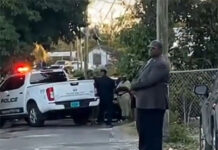Prime Minister and Minister of Finance the Rt. Hon. Hubert Ingraham responds to questions from reporters during a press conference as Minister of National Security the Hon. O.A.T. “Tommy” Turnquest looks on at the Lynden Pindling International Airport on Wednesday, November 28, 2007. (Photo/Tim Aylen)
By: Llonella Gilbert
NASSAU, The Bahamas — The death penalty will be carried out for persons sentenced to death, once the judiciary processes determine it, Prime Minister the Rt. Hon. Hubert Ingraham said Wednesday, November 28, 2007.
Prime Minister Ingraham explained that the Privy Council determined that a mandatory sentence given in respect of a murder conviction is no longer lawful and that there must be alternate sentences handed down by court.
“Well a number of such cases are now going through the process of the courts and eventually they will be disposed of and determined.
“It is our hope and expectation, at the end of the day, that some of them will result in the imposition of the death penalty and if they do, we will carry it out as we have done in the past.”
At a press conference upon his return from the Commonwealth Heads of Government Meeting in Uganda that took place November 23 – 25, Prime Minister Ingraham said his government is very concerned about the number of murders in the country.
As result, he had Minister of National Security the Hon. O.A.T. “Tommy” Turnquest give him vital statistics on the number of murders committed in the country up to November 25.
Prime Minister Ingraham explained that there were 71 murders recorded and the last time the number of murders was that high was in 2000, when there were just over 70 murders.
But he also pointed out that by 2001 there was a reduction in the number to about 43.
“We have been going up and down,” Prime Minister Ingraham said. “Some years it is bad and some years it is not so bad. This is a bad year in terms of the number.”
He said he was particularly interested in discovering who is being arrested and charged and who the victims are.
Prime Minister Ingraham noted that the statistics show that 64 per cent or two thirds of the persons murdered had prior criminal records.
Secondly, he pointed out that three quarters of the murder suspects had prior criminal records and that 10 murder suspects (19 per cent) had been previously charged with the offence of murder.
And 42 per cent (or 22) of the murder suspects were already on bail at the time of the alleged commissioning of these offences.
Giving a rundown of the statistics, Prime Minister Ingraham said of the 71 murders that have been committed the police have charged just under 60 persons.
Seventeen of them were related to domestic issues; 11 of them related to conflicts or arguments; 13 of them were related to violent criminal activity such as robberies; six appear to be revenge killings and with the other 20 it has not yet been determined.
He added that the overall rate of detection so far is just around 70 per cent, good, we could do better and we would do better soon.
“So while the numbers in and of themselves is staggeringly high,” Prime Minister Ingraham said, “when one does an analysis of the actual murders committed, one is able to draw some conclusions that the numbers do not project without explanations.
He also pointed out that in 2000, many of the murders were related to drug-related events.
“However, this time lots of the murders appear to be connected with persons who have been engaged in criminal activity, both from the perpetrators point of view and in many cases from the victims’ point of view.
“And with the number of murders by persons not so involved, have not shot up in any substantial way, and the substantial increase appears to be related to persons previously engaged in criminal activity.”
Prime Minister Ingraham noted that many of the victims and the persons being held in connection with murders were on bail for similar offences.
As a result, he will be agitating for speedy trials.
Prime Minister Ingraham added that if there were four more criminal courts opened in New Providence and Freeport, there would be a dent in the backlog of cases.








